✕
499 results
Economics has become a monolithic science, variously described as formalistic and autistic with neoclassical orthodoxy reigning supreme. So argue Dimitris Milonakis and Ben Fine in this new major work of critical recollection.
This collection of previously published and new papers is a major intervention in the on-going debate about the nature and future of economics. Instead of the present deductivist-formalist orientation of mainstream economics, Lars Syll advocates for the adoption of a more pluralist approach to economics, arguing for more realism and relevance with less insistence on mathematical modeling.
Diane Perrons and Sigrid Stagl combine feminist and critical environmental economics perspectives to develop a critique of the free market growth model and offer new ideas for a more sustainable gender equitable model of development in the interests of all.
Despite the Doha declaration of November 2001, the failure to start a new round of global trade negotiations at Seattle in December 1999 and the hostility of protesters to the trade liberalization process and growing global economic and social disparities was a wake-up call for the World Trade Organisation (WTO).
The world has changed dramatically in recent years and so has the field of economics, but many introductory economics textbooks have remained stuck in the past. This book provides a new beginning for the study of macroeconomics, fundamentally international in its approach and emphasizing current debates and research trends.
The new edition of this classroom classic retains the organizing theme of the original text, presenting the development of thought within the context of economic history.
Author of a dozen books in economics and history, she was formerly known as Donald. Her experience in changing gender is reflected in the new edition, but the message remains the same: economics needs to get serious about its rhetoric, and back to science.
Readers of economic and political theory as well as students of economic planning will appreciate this classic, now available for the first time in English. Written eighty years ago, when Sorel became disillusioned with the official socialism of the German and French Marxist parties, this new translation presents Sorel's analysis of the rise and fall of the two great modern ideologies: socialism and liberal capitalism.
Foreign exploitation of economic crises in the developing world has been a central claim of neoliberal critics. This important and recurring international theme is the subject of closer scrutiny in this new collection, where contributors offer competing interpretations of the interaction between international and domestic forces after crises.
How did Britain's economy become a bastion of inequality? In this landmark book, the author of The New Enclosure provides a forensic examination and sweeping critique of early-twenty-first-century capitalism. Brett Christophers styles this as 'rentier capitalism', in which ownership of key types of scarce assets--such as land, intellectual property, natural resources, or digital platforms--is all-important and dominated by a few unfathomably wealthy companies and individuals: rentiers.
This reports presents empirical findings of research conducted by Michelle Holder, assistant professor of economics at John Jay College, City University of New York, with regard to the impact of what she terms a "double gap"- gender wage gap and ethnic minority wage gap - on the U.S. labour market.
Research on consumption from an environmental perspective has exploded since the late 1990s. This important new volume cuts across disciplines to present the latest research in the field. The book is divided into three parts, the first of which addresses the problems of consumption both as a concept and as an economic and social force with high environmental impact.
This book provides a comprehensive description of this intriguing new area of feminist economics. It includes discussion of what constitutes feminist economics and how feminist economics is different from other approaches
The new online platform ‚DIY Macroeconomic Model Simulation‘ provides an open-source code repository and online script for macroeconomic model simulation. It follows a “do-it-yourself” (DIY) approach, empowering users to numerically simulate key macroeconomic models on their own using the programming language R.
This brilliantly concise book is a classic introduction to Marx’s key work, Capital. In print now for over a quarter of a century, and previously translated into many languages, the new edition has been fully revised and updated, making it an ideal modern introduction to one of the most important texts in political economy.
Shadow banking became one of the main features of modern market based financial capitalism and financial globalisation. Daniel Gabor locates this development in a Super-Cycle framework and sketches out opportunities to launch a new cycle that is green and just through financial regulation and publicly organised sustainable finance.
Rethinking Economics NL explores every month together with a new host the field of economics from a different perspective.
The present working paper is dedicated to fill a void in the degrowth literature related to the aspect of planning to achieve post-growth models of societies. The authors propose a new framework that focuses on non-market forms of planning and propose multi-level planning institutions to mediate the local level with society-wide and global institutions.
This article outlines the fundamental challenges of democratically planned economies and categorises proposed models into six groups, each of which approaches planning and coordination at different levels of authority and between myriad economic units in a particular way, taking into account efficiency as well as democratic principles and environmental and social sustainability. Through a classification system based on decision-making authority and mediation mechanisms, the article provides a framework for understanding and comparing these models. By examining their different approaches, it offers insights into the complexities and potential paths of democratically planned economies in the 21st century.
From the two premises that (1) economies are complex systems and (2) the accumulation of knowledge about reality is desirable, I derive the conclusion that pluralism with regard to economic research programs is a more viable position to hold than monism. To substantiate this claim an epistemological framework of how scholars study their objects of inquiry and relate their models to reality is discussed. Furthermore, it is argued that given the current institutions of our scientific system, economics self-organizes towards a state of scientific unity. Since such a state is epistemologically inferior to a state of plurality, critical intervention is desirable.
Modern Monetary Theory (MMT) is a school of monetary and macroeconomic thought that focuses on the analysis of the monetary and credit system, and in particular on the question of credit creation by the state.
This module examines current socio-political issues through the lens of pluralism, that is pluralism of theory, pluralism of method and interdisciplinary pluralism
Dependency in Central and Eastern Europe - Self-reliance and the need to move beyond economic growth
In this essay, the author takes a critical perspective on the pursuit of growth as the solution for providing for environmental sustainability and economic stability in the countries of Central and Eastern Europe.
Drawing from the framework of dependency theory and presenting brief insights into European core-periphery relations the author then argues for the implementation of an alternative strategy to development that is built around the concept of self-reliance.
Institutional economics focuses on the role of social institutions in terms of laws or contracts, but also those of social norms and patterns of human behaviour that are connected to the social organisation of production, distribution and consumption in the economy.
Exploring Economics, an open-source e-learning platform, giving you the opportunity to discover & study a variety of economic theories, topics, and methods.
Who are the 86 laureates of the economics “Nobel prize”, and what are their scientific contributions? This course will present the major concepts, theories, and results in modern economics, through an overview of the work of a selection of economics “Nobel prize” as well as Leontief prize laureates.
The most influential and controversial economist of the twentieth century, John Maynard Keynes was the leading founder of modern macroeconomics, and was also an important historical figure as a critic of the Versailles Peace Treaty after World War I and an architect of the Bretton Woods international monetary system after World War II.
This paper starts with an evaluation of three common arguments against pluralism in economics: (1) the claim that economics is already pluralist, (2) the argument that if there was the need for greater plurality, it would emerge on its own, and (3) the assertion that pluralism means ‘anything goes’ and is thus unscientific. Pluralist responses to all three arguments are summarized. The third argument is identified to relate to a greater challenge for pluralism: an epistemological trade-off between diversity and consensus that suggests moving from a discussion about ‘pros’ and ‘cons’ towards a discussion about the adequate degree of plurality. We instantiate the trade-off by showing how it originates from two main challenges: the need to derive adequate quality criteria for a pluralist economics, and the necessity to propose strategies that ensure the communication across different research programs. The paper concludes with some strategies to meet these challenges.
The objective of the course is to explore the main strengths and weaknesses of orthodox and heterodox paradigms within development economics.
In this essay the author elaborates on the EU's perspective on the fast growing sector of the platform economy.
Austrian economics focuses on the economic coordination of individuals in a market economy. Austrian economics emphasises individualism, subjectivism, laissez-faire politics, uncertainty and the role of the entrepreneur, amongst others.
The outbreak of COVID-19 has substantially accelerated the digitalization of the economy. Yet, this unprecedented growth of digital technology brought novel challenges to the labour market. Rise in income inequalities and precarious working conditions or polarization of jobs. In this essay, we try to assess what tools to use to counter these trends.
We use cookies on our website. Click on Accept to help us to make Exploring Economics constantly better!































